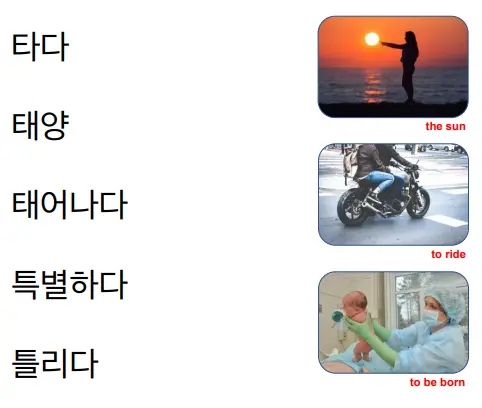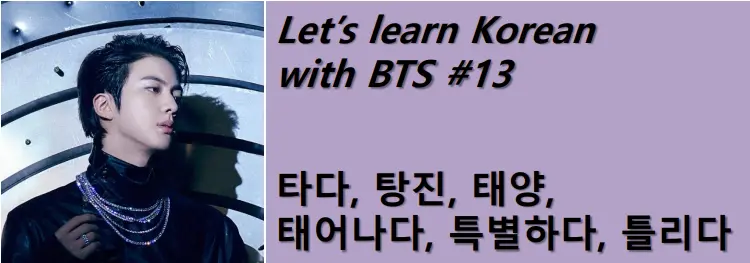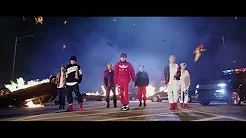Basic Korean words beginning with the consonant ㅌ([ti-eut], [t] sound)
Let’s learn Korean words 타다, 탕진, 태양, 태어나다, 특별하다, 틀리다 with BTS lyrics.
Click on the image below to listen to all the BTS lyrics used in this post.
타다 [ta-da] to ride, to get on

ⒷⓉⓈ 비행기 몇 시간을 타?
bi-haeng-gi myeot si-ga-neul ta
How many hours do we fly?
*비행기(airplane) +
몇(how many) +
시간(hour) + 을(object particle) +
타(ride)?
타다 [ta-da] to worry oneself (about sb/sth)

ⒷⓉⓈ 못 다한 말에 불난 듯 속만 타
mot da-han ma-re bul-nan deut sok-man ta
My heart is just burning inside at the unfinished words as if it’s on fire
*못(not) + 다한(다하다(fulfill, carry out) + ㄴ(noun modifier)) +
말(words) + 에(at) +
불난(불나다(be on fire) + ㄴ(noun modifier)) + 듯(as if) +
속(inside) + 만(only) +
타 (burn)
(*속타다[속이 타다] means to be worried.)
탕진 [tang-jin] waste, squandering

ⒷⓉⓈ 하루아침에 전부 탕진
ha-ru-a-chi-me jeon-bu tang-jin
I waste all my fortune overnight
*하루(day) +
아침(morning) + 에(in) +
전부(everything) +
탕진(waste)
(*The word ‘전부’ is actually a combination of Chinese characters. ‘전’ (jeon) means ‘complete’ or ‘all’ and ‘부’ (bu) means ‘part’ or ‘section’.
As a result, ‘전부’ combines these two characters to convey the meaning of ‘completely all’ or ‘everything in its entirety’. This phrase is used to indicate that something includes all parts within a certain scope or set, and encompasses the entirety of something, whether it’s all parts or sections.)
태양 [tae-yang] the sun

ⒷⓉⓈ 넌 내 하나뿐인 태양 세상에 딱 하나
neon nae ha-na-ppu-nin tae-yang se-sang-e ttak ha-na
You are my only sun, one and only in the world
*넌(너(you) + 는(topic particle), =넌) +
내(나(I) + 의(of), =내) +
하나뿐인(하나(one) + 뿐(only) + 이다(to be) + ㄴ(noun modifier)) +
태양(sun) +
세상(the world) + 에(in) +
딱(exactly) +
하나(one)
태어나다 [tae-eo-na-da] to be born

ⒷⓉⓈ 우린 두 번 태어나지
u-rin du beon tae-eo-na-ji
We’re born again
*우린(우리(we) + 는(topic particle), =우린) +
두(two) + 번(time) +
태어나지(be born)
(*우린 is a shortened form of 우리는.)
특별하다 [teuk-ppyeol-ha-da] to be special

ⒷⓉⓈ 너란 사람은 내게 가장 특별해
neo-ran sa-ra-meun nae-ge ga-jang teuk-bbyeol-hae
You’re the most special person to me
*너란(너(you) + 라는(called, named), =너란) +
사람(person) + 은(topic particle) +
내게(나(I) + 에게(to), =내게) +
가장(the most) +
특별해(특별(specialness) + 하다(to do, to be))
(*너란 is a shortened form of 너라는 and 내게 is a shortened form of 나에게.
The word ‘특별’ is also a combination of Chinese characters. ‘특’ means ‘special’ or ‘unique’ and ‘별’ means ‘different’ or ‘distinct’. These two characters combine to form the word ‘특별’, which means a special or unique state or situation that is different from the ordinary.)
틀리다 [teul-li-da] to be wrong

ⒷⓉⓈ 내가 뭐 틀린 말 했어?
nae-ga mwo teul-lin mal haet-sseo
Did I say something wrong?
*내가(나(I) + 가(subject particle), =내가) +
뭐(what) +
틀린(틀리다(to be wrong) + ㄴ(noun modifier)) +
말(words) +
했어(did?)
(*뭐 is the shortened form of 무엇. 무엇 is a noun and 뭐 is an adverb or a noun.
무슨 also means ‘what’, but it’s an adjective, so you can use it if you have a noun after it.
To make a verb past tense, you must first remove 다 from the infinitive form of the verb, which gives you the verb stem. Then you must add the correct past tense ending to the verb to make it past tense.
If the last vowel in a verb stem is ㅏ or ㅗ, add 았다 or 았어 or 았어요.
If the last vowel in a verb stem is NOT ㅏ or ㅗ, add 었다 or 었어 or 었어요.
Also, if a verb ends in 하다, change the 하다 to 했다 or 했어 or 했어요 to make it past tense.)
Grammar Reference
*Korean sentence structures for interrogative sentences
A declarative sentence structure S+V+O in English is changed to S+O+V in Korean.
For an interrogative sentence, the declarative sentence S+V+O is changed to V+S+O or V+S+V+O in English but S+O+V isn’t changed in Korean.
ex)내가 틀린 말(을) 했다. (S+O+V) -> I said something wrong. (S+V+O)
내가 틀린 말(을) 했어? (S+O+V) -> Did I say something wrong? (V+S+V+O)
*Adjective[verb] stem + ㄴ/은/는/을 + noun : noun that adjective[verb]
ex)못 다한 말 : 못(not) + 다한(다하다(fulfill, carry out) + ㄴ(noun modifier)) + 말(words)
틀린 말 : 틀린(틀리다(to be wrong) + ㄴ(noun modifier)) + 말(words)
ㄴ/은/는/을 is added to verbs and adjectives to allow them to function as noun modifiers
*Noun + ~에 : at[on, in, to, into]
ex)하루아침에 : 하루(day) + 아침(morning) + 에(in),
세상에 : 세상(the world) + 에(in))
*Noun + ~에게 : to
ex)내게 : 나(I) + 에게(to)
*Noun/verb/adjective + 뿐(이다) : just, only
ex)하나뿐인 : 하나(one) + 뿐(only) + 이다(to be) + ㄴ(functions as a noun modifier)
*Noun + ~이/가 : noun + subject particle
ex)내가 : 나(I) + 가(subject particle)
이 for nouns ending in a consonant, 가 for nouns ending in a vowel.
*Noun + ~은/는 : noun + topic particle
ex)넌 : 너(you) + 는(topic particle)
사람은 : 사람(person) + 은(topic particle))
은 for nouns ending in a consonant, 는 for nouns ending in a vowel.
*Noun+하다 : verb
Many Korean nouns that indicate or describe an action or behavior can be combined with 하다 to form verbs.
In some cases, nouns can be turned into verbs by simply adding the verb 하다(to do, to be).
ex)특별(specialness) + 하다 = 특별하다(to be special)
*Easy Korean Numbers: Counting in Korean from 1 – 100+
ex)하나뿐인 : 하나(one)+뿐인(only)
두 번 : 두(two) + 번 (time)
You can learn numbers in Korean on the website below.
Easy Korean Numbers: Counting in Korean from 1 – 100+
Quiz. Linking words to images

BTS music video to enjoy
Well done for making it this far.
Watch the MIC Drop music video above and see if you can hear “비행기 몇 시간을 타?”, which you learned today.



